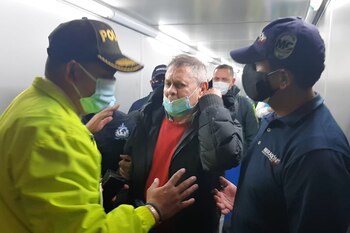
A new episode in the judicial novel that has become the trial against Carlos Mattos, who presided over the franchise in Colombia of the car company Hyundai, and who after a stumbling extradition, being caught on video when he was mobilizing in Bogotá when he was supposed to be in his place of imprisonment, he would now be getting rid of answer for two of the four offenses for which he is syndicated, all on account of the extradition treaty with Spain, where he has second nationality.
The former representative of the South Korean company is responding for allegedly bribing the judicial authorities to receive compensation in 2015 after the Ecuadorian company Neocorp, of the Eljuri group, was left with representation of that brand in Colombia, which Mattos denounced as a unfair competition, as explained in a 2018 article in the newspaper El Tiempo.
At that time, the controversial businessman was in Spain, where he also holds his second nationality, so his extradition was required, which took effect until November last year, and he was detained in the La Picota prison in southern Bogotá.
Once in the country, Mattos accepted his responsibility in the corruption case and reached a pre-agreement in which he would pay $1 million to both the Judicial Branch and the Attorney General's Office, according to what La W Radio reported earlier this month.
But at that time, also when March began, the businessman was caught on video when he was visiting the lawyer Iván Cancino, then his lawyer, a way out that was not authorized, since he had only been allowed to attend a few medical appointments he had.
After that episode he was sent to the maximum security prison in Cómbita (Boyacá), where he remains in detention following this new scandal that cost Major General Mariano Botero Coy, who was the director of the National Penitentiary Institute of Colombia (INPEC), his position.
Now, the one who was the top representative of Hyundai in Colombia would only be responsible for the crimes of bribery and computer damage, and not for the illicit use of communications networks, abusive access to a computer system, which were charged to him by the country's prosecutor's office.
As they explained in the newspaper El Tiempo, the benefit would be obtained because in the Spanish Penal Code they are not considered crimes and in the European country they only authorized their extradition for the two aforementioned acts.
In the Bogotá newspaper they also reported that the Prosecutor's Office will request clarification on this issue, through the International Affairs Department of that body, since Mattos could not be legally prosecuted for such crimes.
Even the judge pointed out that such clarity is required, since Colombia must abide by the international agreements on reciprocity that it has, they indicated in El Tiempo, after the last hearing in this case and at which Mattos appeared virtually from Cómbita.
Regarding this diligence, the businessman responded to the allegation that he had also bribed prosecutors Daniel Hernández and Álvaro Betancourt to reach the agreement he had with the investigating body and that he fell after his episode of the unauthorized visit to lawyer Cancino, as reported on Caracol Radio.
“That is an absolute falsehood, total and full of poison,” they quoted on the radio about what he said during the hearing.
KEEP READING:
Últimas Noticias
Debanhi Escobar: they secured the motel where she was found lifeless in a cistern

The oldest person in the world died at the age of 119

Macabre find in CDMX: they left a body bagged and tied in a taxi
The eagles of America will face Manchester City in a duel of legends. Here are the details

Why is it good to bring dogs out to know the world when they are puppies




